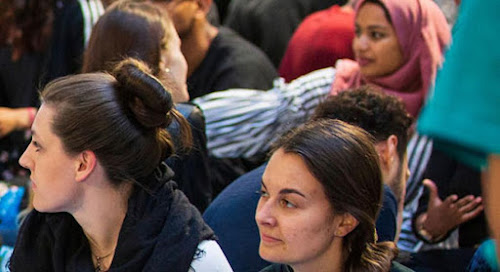what is human rights
Civils rights are ethical concepts or norms[1] that explain certain requirements of human behavior and are regularly protected as all-natural and lawful rights in community and worldwide legislation.[2] They are commonly comprehended as inalienable,[3] essential rights "to which an individual is naturally qualified simply because she or he is a human"[4] and which are "fundamental in all humans",[5] no matter of their age, ethnic beginning, place, language, religious beliefs, ethnicity, or other condition.[3] They are appropriate everywhere and at every time in the sense of being global,[1] and they are egalitarian in the sense of being the same for everybody.[3] They are considered requiring compassion and the guideline of law[6] and enforcing a responsibility on individuals to respect the civils rights of others,[1][3] and it's typically considered that they should not be removed other than consequently of due process based upon specific circumstances;[3] for instance, civils rights may consist of flexibility from illegal jail time, torture, and implementation.[7]
The teaching of civils rights has been highly prominent within worldwide legislation and global and local organizations.[3] Activities by specifies and non-governmental organisations form a basis of public law worldwide. The idea of human rights[8] recommends that "if the general public discussion of peacetime global culture can be said to have a common ethical language, it's that of civils rights". The solid claims made by the teaching of civils rights proceed to provoke significant scepticism and arguments about the content, nature and reasons of civils rights to today. The precise meaning of the call right is questionable and is the topic of continued thoughtful debate;[9] while there's agreement that civils rights encompasses a wide range of rights[5] such as the right to a reasonable test, protection versus enslavement, prohibition of genocide, free speech[10] or a best to education and learning, there's dispute about which of these particular rights should be consisted of within the basic structure of human rights;[1] some thinkers recommend that civils rights should be a minimal demand to avoid the worst-case misuses, while others see it as a greater standard.[1][11] Beberapa Analisa Dalam Betting Judi Bola Online
Many of the keynotes that computer animated the c ivils rights movement developed in the consequences of the Second Globe Battle and the occasions of the Holocaust,[6] finishing in the fostering of the Global Statement of Human Rights in Paris by the Unified Countries Basic Setting up in 1948. Old individuals didn't have the same contemporary perception of global civils rights.[12] Real forerunner of civils rights discussion was the idea of all-natural rights which appeared as component of the middle ages all-natural legislation custom that became prominent throughout the European Knowledge with such philosophers as John Locke, Francis Hutcheson and Jean-Jacques Burlamaqui and which featured plainly in the political discussion of the American Transformation and the French Transformation.[6] From this structure, the modern civils rights disagreements arised over the last fifty percent of the 20th century,[13] potentially as a response to slavery, torture, genocide and battle criminal offenses,[6] as a realisation of fundamental human susceptability and as being a precondition for the opportunity of a simply culture.[5]
ivils rights movement developed in the consequences of the Second Globe Battle and the occasions of the Holocaust,[6] finishing in the fostering of the Global Statement of Human Rights in Paris by the Unified Countries Basic Setting up in 1948. Old individuals didn't have the same contemporary perception of global civils rights.[12] Real forerunner of civils rights discussion was the idea of all-natural rights which appeared as component of the middle ages all-natural legislation custom that became prominent throughout the European Knowledge with such philosophers as John Locke, Francis Hutcheson and Jean-Jacques Burlamaqui and which featured plainly in the political discussion of the American Transformation and the French Transformation.[6] From this structure, the modern civils rights disagreements arised over the last fifty percent of the 20th century,[13] potentially as a response to slavery, torture, genocide and battle criminal offenses,[6] as a realisation of fundamental human susceptability and as being a precondition for the opportunity of a simply culture.[5]
 ivils rights movement developed in the consequences of the Second Globe Battle and the occasions of the Holocaust,[6] finishing in the fostering of the Global Statement of Human Rights in Paris by the Unified Countries Basic Setting up in 1948. Old individuals didn't have the same contemporary perception of global civils rights.[12] Real forerunner of civils rights discussion was the idea of all-natural rights which appeared as component of the middle ages all-natural legislation custom that became prominent throughout the European Knowledge with such philosophers as John Locke, Francis Hutcheson and Jean-Jacques Burlamaqui and which featured plainly in the political discussion of the American Transformation and the French Transformation.[6] From this structure, the modern civils rights disagreements arised over the last fifty percent of the 20th century,[13] potentially as a response to slavery, torture, genocide and battle criminal offenses,[6] as a realisation of fundamental human susceptability and as being a precondition for the opportunity of a simply culture.[5]
ivils rights movement developed in the consequences of the Second Globe Battle and the occasions of the Holocaust,[6] finishing in the fostering of the Global Statement of Human Rights in Paris by the Unified Countries Basic Setting up in 1948. Old individuals didn't have the same contemporary perception of global civils rights.[12] Real forerunner of civils rights discussion was the idea of all-natural rights which appeared as component of the middle ages all-natural legislation custom that became prominent throughout the European Knowledge with such philosophers as John Locke, Francis Hutcheson and Jean-Jacques Burlamaqui and which featured plainly in the political discussion of the American Transformation and the French Transformation.[6] From this structure, the modern civils rights disagreements arised over the last fifty percent of the 20th century,[13] potentially as a response to slavery, torture, genocide and battle criminal offenses,[6] as a realisation of fundamental human susceptability and as being a precondition for the opportunity of a simply culture.[5].jpg)

